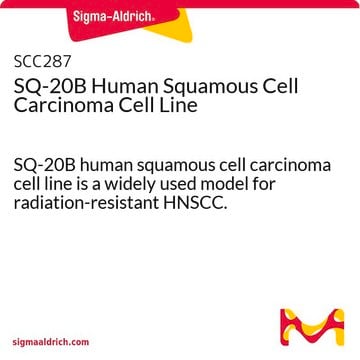SCC280
SCC-61 Human Squamous Cell Carcinoma Cell Line
SCC-61 human squamous cell carcinoma cell line is a good model for studying radiation resistance in SCC cancer cells.
Se connecterpour consulter vos tarifs contractuels et ceux de votre entreprise/organisme
About This Item
Code UNSPSC :
41106514
Nomenclature NACRES :
NA.81
Produits recommandés
Application(s)
cell analysis
Description générale
Squamous cell carcinoma of the head and neck (HNSCC) is the 9th-most common cancer worldwide and is characterized by a high rate of recurrence after therapy, with a median 5-year survival range of 40-50% (1). HNSCC tumors show a wide range of heterogeneity in response to radiation therapy. Cellular HNSCC models that demonstrate a range of radiation sensitivity are thus invaluable for elucidating the factors underlying radiation responses of cancer cells.
The SCC-61 HNSCC cell line, derived from an aggressive tongue squamous cell carcinoma (2), is an established model for HNSCC. SCC-61 cells are relatively sensitive to radiation compared to other HNSCC cell lines as well as a relatively stable genome (3). SCC-61 cells grow robustly and are strongly adherent in culture. SCC-61 cells have been characterized by positive expression of the SCC marker p63 (p40) (4). SCC-61 cells have demonstrated utility in studies parsing mechanisms of radio-resistance in SCC tumor cells, as demonstrated by transformation of this cell line with factors conferring radio-resistance (5).
<bold>Source:</bold>
SCC-61 cell line was derived from a tongue squamous cell carcinoma of a male patient (2).
Research Category:
Cancer
The SCC-61 HNSCC cell line, derived from an aggressive tongue squamous cell carcinoma (2), is an established model for HNSCC. SCC-61 cells are relatively sensitive to radiation compared to other HNSCC cell lines as well as a relatively stable genome (3). SCC-61 cells grow robustly and are strongly adherent in culture. SCC-61 cells have been characterized by positive expression of the SCC marker p63 (p40) (4). SCC-61 cells have demonstrated utility in studies parsing mechanisms of radio-resistance in SCC tumor cells, as demonstrated by transformation of this cell line with factors conferring radio-resistance (5).
<bold>Source:</bold>
SCC-61 cell line was derived from a tongue squamous cell carcinoma of a male patient (2).
Research Category:
Cancer
Origine de la lignée cellulaire
Human, Cancer Cells
Conditionnement
≥1X106 cells/vial
Stockage et stabilité
Store in liquid nitrogen. The cells can be cultured for at least 10 passages after initial thawing without significantly affecting the cell marker expression and functionality.
Autres remarques
This product is intended for sale and sold solely to academic institutions for internal academic research use per the terms of the “Academic Use Agreement” as detailed in the product documentation. For information regarding any other use, please contact licensing@emdmillipore.com.
Clause de non-responsabilité
Unless otherwise stated in our catalog or other company documentation accompanying the product(s), our products are intended for research use only and are not to be used for any other purpose, which includes but is not limited to, unauthorized commercial uses, in vitro diagnostic uses, ex vivo or in vivo therapeutic uses or any type of consumption or application to humans or animals.
Code de la classe de stockage
10 - Combustible liquids
Classe de danger pour l'eau (WGK)
WGK 1
Point d'éclair (°F)
Not applicable
Point d'éclair (°C)
Not applicable
Certificats d'analyse (COA)
Recherchez un Certificats d'analyse (COA) en saisissant le numéro de lot du produit. Les numéros de lot figurent sur l'étiquette du produit après les mots "Lot" ou "Batch".
Déjà en possession de ce produit ?
Retrouvez la documentation relative aux produits que vous avez récemment achetés dans la Bibliothèque de documents.
Notre équipe de scientifiques dispose d'une expérience dans tous les secteurs de la recherche, notamment en sciences de la vie, science des matériaux, synthèse chimique, chromatographie, analyse et dans de nombreux autres domaines..
Contacter notre Service technique





